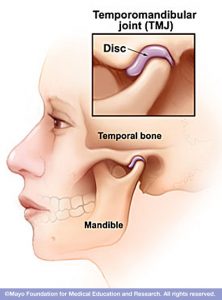Temporomandibular joint disorders (TMD) commonly called “TMJ,” are a group of conditions that cause pain and dysfunction in the jaw joint and the muscles that control jaw movement. For most people with TMD, it is a short duration of discomfort in and around the jaw joints that is cyclical and clears up on its own. For a few the pain can be chronic and significant. Symptoms include: Some helpful home remedies are: When treating TMD we believe a conservative and minimally invasive approach is best. Diagnosing the cause is the first step, then a plan can be tailor made for each patient. A centric relation (CR) splint is made so when your bite on the splint is in harmony with the movements of your joint. This step is also used to diagnose the cause. If you are still having problems when wearing the splint we will order test for any internal disease of the joint (about 5% of cases). When your symptoms are gone we will determine what needs to be done to have the teeth be in harmony with your joint. This will include removing any dis-harmonies in way your teeth guide the movements of your jaw. In mild cases we will grind down minute areas of the teeth to get rid of dis-harmonies (called an equilibration). In moderate case we will placing fillings or crowns to synchronize the teeth to the joint. In severe case it may be best to move the teeth with braces or invisalign. If you are having sings of TMJ problems, contact our office for an appointment.
Centric Relation Splint
Temporomandibular Disorders (TMJ)
